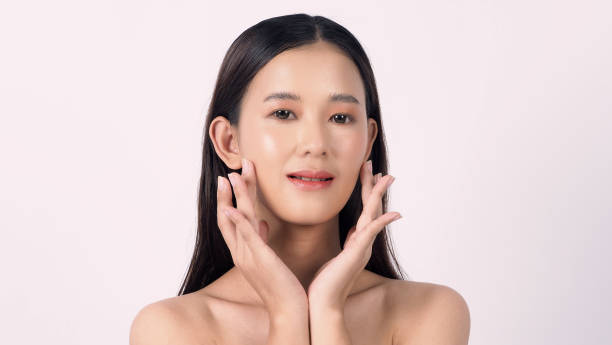The quest for a youthful complexion is a timeless endeavor and a central topic in the realm of beauty and skincare. In this article, we will delve into a variety of practical techniques to help turn back the hands of time on your face. From daily skincare rituals and product selection to lifestyle changes and professional services, you’ll learn how to maintain and restore the fresh, vibrant appearance of your skin. Remember, while genetics play a role, your skincare routine and habits are key factors in keeping your face looking young.
Understanding the Science of Skin Aging

To effectively combat aging, it’s crucial to understand the underlying mechanisms that cause our skin to change over time. Our skin naturally loses collagen and elastin, the proteins responsible for its elasticity and firmness, as we age. Furthermore, external factors such as sun exposure, pollution, and lifestyle choices can accelerate this process. By grasping these concepts, you’ll be better equipped to choose protective and restorative skincare practices.
Daily Skincare Routine for Ageless Beauty

Maintaining a youthful and radiant complexion requires a consistent and thoughtful skincare routine. Following a daily regimen that caters to your skin’s specific needs can significantly improve its appearance and health over time. Here’s an effective daily skincare routine aimed at achieving ageless beauty:
- Cleansing: Start your day by gently cleansing your face to remove overnight build-up of oils and impurities. Use a mild cleanser that doesn’t strip your skin of its natural oils.
- Toning: After cleansing, apply a toner to help restore your skin’s pH balance and prepare it for the absorption of other skincare products.
- Serum Application: Apply a serum rich in antioxidants like Vitamin C or E, or one that contains anti-aging ingredients like retinol or hyaluronic acid to target specific concerns such as fine lines, wrinkles, or dryness.
- Moisturizing: Use a moisturizer that fits your skin type to hydrate and protect your skin. For daytime, opt for a formula that contains SPF to protect against sun damage.
- Eye Care: Apply an eye cream to address issues like dark circles, puffiness, and crow’s feet. The skin around the eyes is delicate and needs special attention.
- Weekly Exfoliation: Incorporate a gentle exfoliator into your routine 1-2 times a week to remove dead skin cells and promote cell turnover, which keeps your skin looking fresh and vibrant.
Sun Protection: Your First Line of Defense
Sun protection is essential not only for maintaining healthy skin but also as a primary defense against the harmful effects of UV radiation. Prolonged exposure to the sun’s rays can lead to skin aging, sunburn, and an increased risk of skin cancer. Effective sun protection involves several key practices: using a broad-spectrum sunscreen with a high SPF to shield skin from both UVA and UVB rays, wearing protective clothing such as hats and long sleeves, seeking shade during peak sun hours, and regularly reapplying sunscreen, especially after sweating or swimming. By integrating these habits into your daily routine, you can significantly reduce your vulnerability to the detrimental effects of sun exposure and promote long-term skin health.
Lifestyle Adjustments for a Youthful Complexion
Achieving and maintaining a youthful complexion involves more than just skincare products; it requires holistic lifestyle adjustments. These changes can significantly enhance skin health and delay the signs of aging. Here are some effective lifestyle adjustments to consider:
- Hydrate Regularly: Drinking plenty of water each day helps maintain the skin’s moisture balance and aids in detoxification.
- Maintain a Balanced Diet: Eating a diet rich in fruits, vegetables, whole grains, and lean proteins can provide the necessary nutrients for skin health.
- Regular Exercise: Physical activity increases blood flow, which helps nourish skin cells and keep them vital. Exercise also helps reduce stress, which can lead to skin problems like acne.
- Adequate Sleep: Aim for 7-9 hours of sleep per night to allow your skin to repair and regenerate.
- Sun Protection: Protect your skin from the sun’s harmful UV rays by applying sunscreen daily, wearing protective clothing, and seeking shade during peak sun hours.
- Avoid Smoking: Smoking accelerates skin aging by impairing blood flow and depleting the skin of oxygen and essential nutrients.
- Limit Alcohol Consumption: Alcohol can dehydrate and damage your skin, so moderation is key.
The Power of Non-Invasive Facial Treatments
For those seeking additional help, a range of non-surgical treatments can offer significant improvements. Chemical peels, microdermabrasion, and various facials can reduce the appearance of fine lines and improve skin texture.
| Treatment | Benefits | Considerations |
|---|---|---|
| Facials | Hydration, pore cleansing | Choose according to skin type |
| Microdermabrasion | Exfoliation, smoothness | Slight redness post-treatment |
| Chemical Peels | Pigmentation correction, renewed texture | Varying downtime required |
When to Consider Professional Anti-Aging Treatments
Deciding when to start professional anti-aging treatments can be pivotal in maintaining youthful skin. As skin ages, it may require more than basic skincare to keep it looking its best. Here are some guidelines on when it might be appropriate to consider professional treatments.
Noticeable Skin Changes
When you start to notice visible changes in your skin such as increased dryness, loss of elasticity, or deepening wrinkles, it may be time to consider professional help. These changes often indicate that your skin’s natural rejuvenation processes are slowing down, which professional treatments can help counteract. Treatments like chemical peels or laser therapy can regenerate the skin more effectively than over-the-counter products.
Preventative Care
Starting anti-aging treatments in your late 20s or early 30s as a preventative measure can be very beneficial. This proactive approach helps to slow the aging process before it becomes evident. Many dermatologists recommend starting with milder treatments such as microdermabrasion or light chemical peels, which can keep the skin vibrant and delay the need for more intensive treatments.
Life Changes and Increased Stress
Significant life changes or increased stress levels can also affect your skin’s health and accelerate aging. If you find that stress, hormonal changes, or lifestyle adjustments are impacting your skin’s appearance, professional treatments might help restore its condition. Techniques like LED light therapy or hydrafacials can reduce stress-induced inflammation and improve overall skin health.
Plateau in Results from Current Skincare Routine
If your current skincare routine is no longer delivering the results you’re used to seeing, it might be time to upgrade to professional treatments. As skin ages, it often becomes more resistant to over-the-counter products. Switching to professional-grade treatments can provide the higher concentrations of active ingredients needed to achieve visible improvements.
Conclusion
While the fountain of youth may be mythical, the principles outlined in this article provide concrete steps towards maintaining a younger-looking face. Remember, it’s a combination of quality skincare, healthy lifestyle choices, and possibly professional treatments that will keep your skin looking its best. Everyone’s journey to maintaining youthful skin is unique; be patient and consistent with your efforts, and consult with a skincare professional to tailor a plan that’s right for you.
FAQs
- Q1: How often should I update my skincare routine for anti-aging?
- A1: At least twice a year; consult with professionals as your skin’s needs change.
- Q2: Are expensive skincare products always more effective for anti-aging?
- A2: Not necessarily; look for effective ingredients over price tags.
- Q3: Can drinking water really help make my face look younger?
- A3: Absolutely; hydration supports elasticity and reduces fine lines.
- Q4: How long does it take to see results from anti-aging treatments like retinoids?
- A4: Typically 3-6 months with consistent use.
- Q5: Is it too late to start an anti-aging skincare routine in my 40s?
- A5: It’s never too late to improve the health and appearance of your skin.



